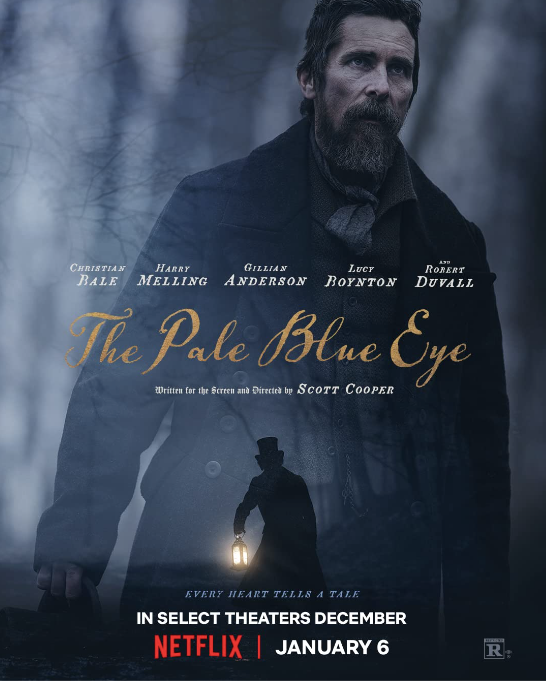
A murder mystery with all kinds of twists featuring a young Edgar Allan Poe quoting from Thomas Grey's "Elegy Written in a Country Churchyard," my all-time favorite poem, what more could I ask for? Well, The Pale Blue Eye has that, as well as a first class story of life at West Point in 1830, so I couldn't ask for much more regarding a movie indeed.
This gem of a movie is in effect a secret history of Poe, that is, a story of what happened to him in 1830 when he was a cadet at West Point and a newly published poet -- a story which could have happened, but no doubt didn't, which is why we don't know anything about it. We find Poe already a published poet at this time, and his involvement in a case in which hearts and other organs are removed from bodies, and his success in figuring out who the ultimate villain was (who was also and mostly a good guy), provides a brilliant case study of how Poe already had and further developed the chops to become the father of the mystery writing genre in our real history.
[Some very general spoilers ahead ... ]
Meanwhile, the mystery story is first class. The ultimate solution is that one person was the murderer (for the sake of revenge) and two other people dismembered most of the dead bodies. This is itself a solution that the real Poe in our history, and for that matter, Agatha Christie, would have approved of.
Like all good secret histories, The Pale Blue Eye offers satisfying anchors to what we know of the real Poe in our history. The stolen physical heart shows up in our reality as one of Poe's most famous short stories, "The Tell-Tale Heart". The name of a beloved and major character shows up as title of one of Poe's best-known poems. And of course there's a raven -- though for all I know, it could have been a crow.
The West Point and surrounding upstate New York ambience in the 1830s feels just right, at least from what I know of it from my late 20th-century early 21st century experience. There's nothing quite like the Hudson River at this point, with the cliffs and the trees and that upstate shade of green. John Crowley captured it well in his science fantasy trilogy, as did Scott Cooper who directed and wrote the script of The Pale Blue Eye, based on Louis Bayard's novel of the same name (which I haven't read). And while we're at it, Harry Melling, whom I recall from the Harry Potter movies and The Queen's Gambit was excellent as Poe, even looking like him, as was Christian Bale, whom I've seen in a ton of movies, as retired NY detective Landor. Robert Duvall as Professor Jean Pepe and Gillian Anderson as Julia Marquis were pleasures to see. And Lucy Boynton, whom I don't recall seeing before, was just right as Lea Marquis. All in all, one stunningly fine cast.
If you're at all a Poe fan, you won't regret seeing this movie. I'm a huge Poe fan, and count it was one of the best films I've seen in years.

Interview with Mark Dawidziak about his book, A Mystery of Mysteries: The Death and Life of Edgar Allan Poe
No comments:
Post a Comment